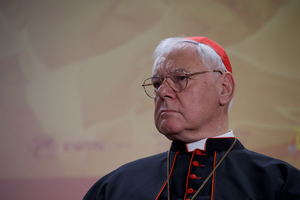Hungary Family Minister: Supporting the Family is Not ‘Nazism’
Katalin Novak explains to the Register how her pro-family government is countering a continental trend

BUDAPEST, Hungary — The Hungarian Parliament passed sweeping pro-family legislation April 1, guaranteeing various married couples and families interest-free loans, mortgage assistance and even childcare allowances for grandparents.
The seven-point package is an “important milestone” in the history of Hungarian family policy, says Katalin Novak, Hungary’s minister for the family, in a Europe that is renouncing its Christian culture and “slowly committing suicide.”
Novak also explains in this April 12 interview with the Register why Hungary has pursued such an overt pro-family approach since 2010, one that statistics show has led Hungary’s abortion rate dropping by 33.5% from 2010 to 2018, marriage increasing by 43%, and divorce decreasing by 22.5% between 2010 and 2017.
She also explains how the Hungarian government has persisted with its pro-family policies despite being demonized as “far-right.” The radicals are those who “believe that immigration should be the only path to choose,” Novak argues. “It’s not normal, for example, to compare family support to Nazism.”
Mrs. Novak, how important was the recent World Congress of Families in Verona — which brought together pro-family leaders from all over the world — to your work in support of the family, and how might it influence your policy formulation in the future?
As a pro-family politician, I appreciated the opportunity to promote the priority and importance of families and present the Hungarian family-friendly model. The event in Verona was a very good opportunity to spread the word to my colleagues about best practices that actually work in Hungary.
We are building a family-friendly country, and we’ve achieved quite a lot in this field. Last year, the birth rate was at its highest for 20 years, as was the number of marriages. I was more than happy to share our experiences with other countries’ representatives and decision-makers.
What were the main points of your talk?
In my speech, I talked about a Europe that is slowly committing suicide. If we renounce our Christian culture and at the same time stop promoting the importance of the family and children and just accept anything that might happen to our continent, we are in practice sacrificing ourselves and committing suicide.
I presented the Hungarian model’s family-policy measures. The Hungarian government has been pursuing a strong family policy and the goal of being a family-friendly country since 2010. This seeks to achieve a turnaround in demographic trends by supporting legislation, financial incentives, assistance, services and a family-friendly mentality. We are also helping those who are already raising children as much as possible. Traditional strong families represent an asset which we intend to defend — not only in Hungary, but internationally, as well.
Were you surprised by the extent of opposition to the congress, and why do you think it drew so many attacks?
I wasn’t surprised, as we’re used to the habits of the left-liberal media, NGOs and politicians that label everything not in line with their views as wrong, radical and far-right extremism. We’re not radicals — we simply want to strengthen families as much as we can, instead of prioritizing immigration.
In Central Europe, we not only understand the demographic crisis we face, but we also want to find our own solutions that address our young people who would like to have children. This is the difference between Central and Western Europe. Western political elites don’t want to dig deeper into the problems, and they choose the simplest path: mass immigration.
We believe that the demographic crisis can only be solved in the long run by relying on our own internal resources. We’ve asked Hungarians many times about how they imagine their future, who they want to live with, and how many children they want.
The answers were crystal-clear: Hungarians are family-oriented; and they love their families, their culture and their traditions. We’ve been given this direction by the Hungarian people. We want to strengthen families, women and young people. We want to provide security, and we want to protect our Christian culture.
In relation to your government’s support for the family, how have you managed to introduce such policies in the face of opposition, and what can other countries learn from your example?
After we won the election in 2010 with a two-thirds majority, we decided to build a family-friendly country and to strengthen families raising children. We thought the opposition would be a partner in this, but since then there have been very few decisions in the field of family policy that they’ve supported. So if we had always taken the opposition’s opinion into account, Hungary would now be on the brink of collapse. There wouldn’t be such a comprehensive family-support system, a family-friendly tax system, a housing program, 800,000 new jobs, and many opportunities to create a balance between life and work. The socialists have driven our country into deep crisis before, and they would do it again. They’re only interested in grabbing power again; to achieve this goal, they’ve even joined forces with the Hungarian far right.
We now spend twice as much on families as in 2010: almost 5% of total GDP, exceeding the OECD average by almost 100%. We have a very complex, comprehensive support system, and we help families in many different fields, including nursery developments, the tax system, housing and pension policy. We are open to sharing our experiences and best practices worldwide.
How can policies supporting the family be separated from the demonizing label of “far right”?
In many cases, everything is considered “far right” that is to the right of a given position. Is it far right and extremist to support families, just because of this? The question itself is misleading.
In our eyes, the radicals are those who believe that immigration should be the only path to choose. It’s not normal, for example, to compare family support to Nazism — as one Swedish minister has done. Our main aim is to provide opportunities and to make it possible for young Hungarians to freely decide about their lives. Is this far right?
How do you see the future? Do you see the tide turning and governments adopting more pro-family policies in the coming months and years?
The starting point is that in Europe there is a battle between anti-migration and pro-migration countries. We want to solve the demographic challenges by strengthening families, while they prefer migration over empowering young Europeans to have more children.
Meanwhile, there are more and more people that are deeply worried about the unchecked influx of illegal immigrants and the rise of terrorist attacks. Europewide I see that there is an increasing demand for good policies that enable people to live better, to have more choice and to receive help when needed.
The European Parliament election in May will be an important milestone. The question is very much about whether the EU is able to renew and strengthen itself by putting families at the core, instead of surrendering.
One thing is clear: We shall continue to support families in the future, and in this we hope to have more and more allies — like Poland or Italy, among others.
What measures does this new legislation, the Family Protection Action Plan, include?
This seven-point package is an important milestone in the history of Hungarian family policy and also in our attempts since 2010 to build a family-friendly country. The law has just been approved by Parliament and will be effective from July 1:
- Married couples in which the wife is under 40 will be eligible for an interest-free, general-purpose loan of 31,000 euro. Repayment can be suspended, significantly reduced or written off entirely if the couple go on to have children.
- Families raising at least three children will be eligible for a grant of 7,800 euro to buy a new car seating at least seven people.
- There will be universal crèche [baby crib] provision by 2022. Therefore, we will be creating 21,000 additional crèche places over the next three years.
- We are providing the opportunity for families to reduce their mortgage loans by 3,100 euro upon the birth of a second child. Upon the birth of a third child, this amount increases to 12,500 euro.
- The preferential home-loan scheme will be extended: Families will be able to use it for purchasing existing properties as well as new ones. The amounts on which repayment relief is available are up to 31,000 euro or 48,000 euro, depending on the number of children.
- And from 1 Jan. 1, 2020:
- We are providing lifetime exemption from personal income tax for Hungarian women who have given birth to at least four children or who will give birth to a fourth child.
- Grandparents will be eligible for childcare allowance.
This is not the end of our work. There is more to come! Hungarian families can count on us.
Edward Pentin is the Register’s Rome correspondent.
- Keywords:
- edward pentin
- hungary
- pro-family policies















